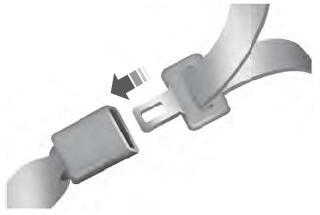Lincoln Aviator: Vehicle Care / Waxing
Regular waxing is necessary to protect your car's paint from the elements. We recommend that you wash and wax the painted surface once or twice a year.
When washing and waxing, park your vehicle in a shaded area out of direct sunlight. Always wash your vehicle before applying wax.
- Use a quality wax that does not contain abrasives.
- Follow the manufacturer’s instructions to apply and remove the wax.
- Apply a small amount of wax in a back-and-forth motion, not in circles.
- Do not allow wax to come in contact with
any non-body (low-gloss black) colored
trim. The wax will discolor or stain the
parts over time.
- Roof racks.
- Bumpers.
- Grained door handles.
- Side moldings.
- Mirror housings.
- Windshield cowl area.
- Do not apply wax to glass areas.
- After waxing, your car's paint should feel smooth, and be free of streaks and smudges.
 Cleaning the Exterior
Cleaning the Exterior
Wash your vehicle regularly with cool or
lukewarm water and a neutral pH shampoo,
we recommend Motorcraft Detail Wash.
Never use strong household detergents
or soap, for example dish washing or
laundry liquid...
 Cleaning the Engine
Cleaning the Engine
Engines are more efficient when they are
clean because grease and dirt buildup keep
the engine warmer than normal.
When washing:
Take care when using a power washer
to clean the engine...
Other information:
Lincoln Aviator 2020-2025 Owners Manual: Switching From Adaptive Cruise Control to Cruise Control
WARNING: Normal cruise control will not brake when your vehicle is approaching slower vehicles. Always be aware of which mode you have selected and apply the brakes when necessary. Use the touchscreen to select the following: Select Settings. Select Driver Assist...
Lincoln Aviator 2020-2025 Service Manual: Description and Operation - Third Row Seats - System Operation and Component Description
System Operation System Diagram Item Description 1 SCMJ 2 HS-CAN1 3 PCM 4 Liftgate Ajar Switch 5 Power Fold Seat Control Switch 6 Power Folding Seat Motors 7 Hall-Effect Sensors 8 Motors 9 MS-CAN 10 GWM 11 BCM Network Message Chart SCMJ Network Input Messages Broadcast Message Originating Module Message Purpose Vehicle speed PCM The vehicle speed is one of the inputs the SCMJ requires to enable the power folding seat feature...
Categories
- Manuals Home
- Lincoln Aviator Owners Manual
- Lincoln Aviator Service Manual
- Garage Door Opener
- Disabling Auto-Start-Stop
- Keyless Entry
- New on site
- Most important about car
Fastening the Seatbelts
The front outboard and rear safety restraints in the vehicle are combination lap and shoulder belts.
Insert the belt tongue into the proper buckle (the buckle closest to the direction the tongue is coming from) until you hear a snap and feel it latch. Make sure that you securely fasten the tongue in the buckle.
Copyright © 2025 www.liaviator2.com
